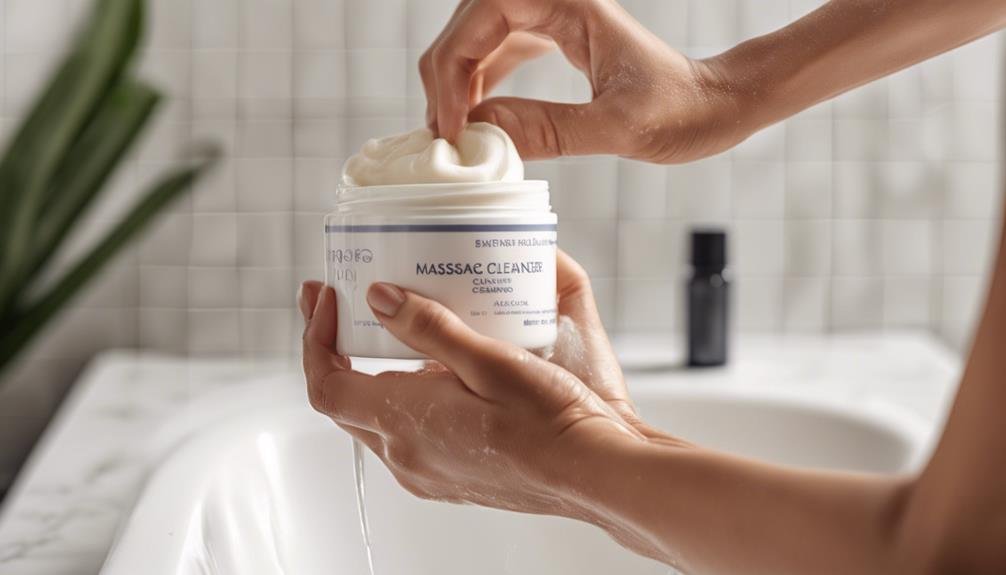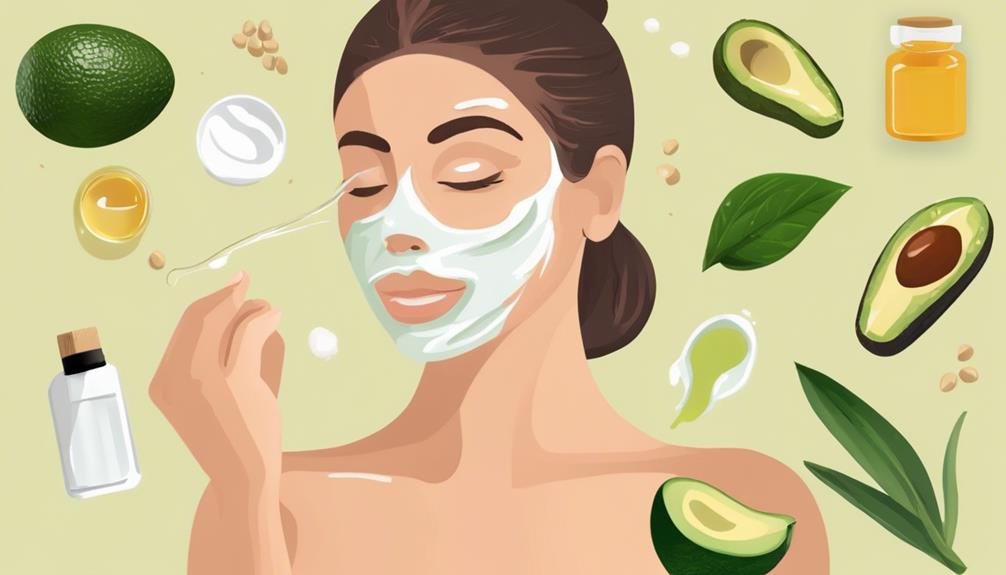If you're tired of dealing with dry skin, there are effective ways to combat it swiftly. By focusing on hydration methods like upping your water intake and incorporating omega-3 fatty acids into your diet, you can make a noticeable difference. Implementing gentle skincare routines and avoiding harsh ingredients can also play a significant role in improving skin moisture levels quickly. But, there's one key aspect you shouldn't overlook; it might just be the game-changer you need.
Key Takeaways
- Drink plenty of water and consume hydrating foods for internal moisture.
- Use a rich moisturizer on damp skin to restore hydration quickly.
- Opt for gentle skincare practices like mild cleansers and lukewarm water.
- Incorporate hydrating masks like avocado or honey for instant relief.
- Avoid harmful skincare ingredients like alcohol and fragrances to prevent further dryness.
Understanding Dry Skin
To combat dry skin effectively, it's essential to first understand the underlying causes and characteristics of this common condition.
Dry skin, also known as xerosis, occurs when the skin lacks the necessary moisture to maintain its smoothness and elasticity. This can be caused by factors such as harsh weather conditions, hot showers, certain skincare products, and underlying skin conditions like eczema or psoriasis.
Symptoms of dry skin may include roughness, itchiness, redness, and flakiness.
Understanding the root cause of your dry skin is crucial in determining the most effective treatment. By identifying potential triggers and making lifestyle adjustments, you can help restore your skin's natural moisture balance.
Using gentle cleansers, moisturizing regularly, protecting your skin from environmental stressors, and staying hydrated are essential steps in managing dry skin.
Hydrate From Within
Boosting your skin's hydration from within is a fundamental step in combating dry skin. Proper internal hydration not only benefits your skin but also supports overall health. To hydrate from within effectively, consider the following:
- Stay Hydrated: Drink plenty of water throughout the day to keep your skin and body hydrated. Aim for at least 8-10 glasses daily.
- Eat Water-Rich Foods: Incorporate water-rich foods like cucumbers, watermelon, and oranges into your diet to boost hydration levels.
- Omega-3 Fatty Acids: Consume foods rich in omega-3 fatty acids such as salmon, flaxseeds, and walnuts to help maintain skin moisture.
- Herbal Teas: Herbal teas like chamomile or green tea not only provide hydration but also offer antioxidant benefits for your skin.
Gentle Cleansing Techniques
For effective management of dry skin, employing gentle cleansing techniques is paramount. Harsh cleansers can strip your skin of its natural oils, leading to further dryness and irritation. Opt for mild, fragrance-free cleansers that are specifically formulated for sensitive or dry skin. When cleansing, use lukewarm water instead of hot water, as hot water can be drying.
To emphasize the importance of gentle cleansing, consider the following table:
| Gentle Cleansing Techniques | Benefits |
|---|---|
| Use a mild, fragrance-free cleanser | Helps prevent stripping of natural oils |
| Avoid hot water | Reduces dryness and irritation |
| Pat skin dry with a soft towel | Prevents additional irritation |
| Limit cleansing to twice a day | Over-cleansing can worsen dryness |
| Consider using a cleansing brush with soft bristles | Gently exfoliates without being harsh |
Incorporating these gentle cleansing techniques into your skincare routine can help combat dry skin and promote a healthier, more hydrated complexion.
Moisturize Strategically
When considering how to effectively manage dry skin, a strategic approach to moisturizing plays a crucial role in restoring hydration and promoting skin health. To ensure you're moisturizing your skin effectively, consider the following tips:
- Choose the Right Moisturizer: Opt for a rich, emollient moisturizer that contains ingredients like hyaluronic acid or glycerin to deeply hydrate your skin.
- Apply Moisturizer to Damp Skin: For maximum absorption, apply your moisturizer immediately after showering or washing your face when your skin is still slightly damp.
- Focus on Problem Areas: Pay extra attention to areas prone to dryness such as elbows, knees, and hands by applying a thicker layer of moisturizer.
- Use a Humidifier: In dry environments, using a humidifier can help add moisture back into the air, preventing your skin from becoming dehydrated.
Exfoliate Regularly
To effectively combat dry skin, regular exfoliation is a key step in promoting skin renewal and enhancing the absorption of moisturizing products. Exfoliation helps to remove dead skin cells that can accumulate on the surface of your skin, allowing for better penetration of your skincare products. By sloughing off these dull and dry layers, you reveal fresher, more radiant skin underneath. Opt for gentle exfoliants with ingredients like alpha hydroxy acids (AHAs) or beta hydroxy acids (BHAs) to prevent irritation and over-exfoliation.
Exfoliating 1-2 times a week can help improve skin texture and clarity, making your skin more receptive to the hydrating benefits of your moisturizers. Be sure to follow up with a rich moisturizer after exfoliating to lock in hydration. However, avoid harsh scrubs or over-exfoliating, as this can strip your skin of its natural oils and exacerbate dryness.
Regular exfoliation can revitalize your skin, leaving it smoother, softer, and more supple.
Protect With Sunscreen
Shielding your skin from the sun's harmful UV rays is essential for maintaining its health and preventing premature aging. Sunscreen is a crucial step in your skincare routine to combat dry skin effectively. Here's why sunscreen matters:
- UV Protection: Sunscreen shields your skin from harmful UV rays that can cause dryness and damage.
- Prevents Wrinkles: Regular use of sunscreen helps prevent premature aging signs like wrinkles and fine lines.
- Maintains Hydration: Sunscreen locks in moisture and prevents water loss from the skin, combating dryness.
- Skin Cancer Prevention: Applying sunscreen daily reduces the risk of developing skin cancer due to sun exposure.
Choose a broad-spectrum sunscreen with at least SPF 30 and apply it generously to all exposed skin, including your face, neck, and hands. Reapply every two hours, especially when outdoors.
Humidify Your Environment
Protecting your skin from the sun with sunscreen is a smart move, but have you considered the impact of your indoor environment on skin hydration? Dry indoor air can strip your skin of moisture, exacerbating dryness and leading to irritation.
Humidifying your environment can help combat this. By adding moisture to the air, you create a more skin-friendly atmosphere that can prevent your skin from drying out. Aim for a humidity level between 45-60% for optimal skin hydration.
Using a humidifier in your bedroom or office can make a significant difference. Additionally, consider placing bowls of water near radiators or vents to increase humidity levels naturally. Remember to clean your humidifier regularly to prevent the growth of mold and bacteria.
Nutrient-Rich Diet
Maintaining a nutrient-rich diet is essential for combating dry skin effectively. Consuming foods rich in vitamins, minerals, and antioxidants can help nourish your skin from within, promoting hydration and a healthy glow. Here are some key nutrients to focus on:
- Omega-3 Fatty Acids: Found in fatty fish, flaxseeds, and walnuts, omega-3 fatty acids help maintain skin moisture and strengthen the skin barrier.
- Vitamin E: This antioxidant can be obtained from almonds, sunflower seeds, and spinach. It helps protect the skin from damage and keeps it hydrated.
- Vitamin C: Citrus fruits, bell peppers, and strawberries are excellent sources of vitamin C, which aids in collagen production and skin repair.
- Zinc: Foods like pumpkin seeds, chickpeas, and beef contain zinc, essential for wound healing and maintaining skin integrity.
Avoid Harsh Ingredients
To effectively combat dry skin, it is imperative to be mindful of the ingredients in your skincare products. Harsh ingredients can strip your skin of its natural oils, exacerbating dryness. When choosing products, look for gentle, hydrating formulations that support skin health. Here are some common harsh ingredients to avoid:
| Harsh Ingredients to Avoid | Potential Effects on Skin | Gentler Alternatives |
|---|---|---|
| Alcohol-based products | Drying and irritating | Products with hyaluronic acid or glycerin |
| Fragrances | Allergic reactions and irritation | Fragrance-free products or products scented with natural oils |
| Sulfates (SLS, SLES) | Stripping natural oils and causing dryness | Sulfate-free cleansers or products with gentle surfactants |
| Parabens | Disruption of hormonal balance | Paraben-free products or products preserved with natural alternatives |
Quick DIY Masks
For combating dry skin swiftly, incorporating quick DIY masks into your skincare routine can provide instant relief and hydration. These masks are easy to create using simple ingredients found in your kitchen, making them a convenient and cost-effective solution for dry skin. Here are some effective DIY masks to try:
- Avocado Mask: Mash a ripe avocado and apply it to your face for 15-20 minutes. Avocado is rich in healthy fats and vitamins that nourish and hydrate the skin.
- Honey and Yogurt Mask: Mix equal parts honey and yogurt, then apply it to your face for 15 minutes. Honey is a natural humectant, while yogurt soothes and moisturizes the skin.
- Oatmeal Mask: Blend oats into a fine powder, mix with water to form a paste, and leave it on your skin for 10-15 minutes. Oatmeal helps to soothe dry, itchy skin and lock in moisture.
- Coconut Oil Mask: Warm up coconut oil and massage it onto your skin, leaving it on for 30 minutes. Coconut oil is a powerful emollient that helps to soften and hydrate dry skin.
Give these DIY masks a try to rejuvenate your skin and combat dryness effectively.
Stay Hydrated
Ensuring your body stays adequately hydrated is essential for maintaining healthy and nourished skin. Water is crucial for the proper functioning of your skin cells, helping to maintain elasticity and smoothness. When you're dehydrated, your skin can appear dull, feel tight, and become more prone to dryness and irritation. Aim to drink at least eight glasses of water a day to keep your skin hydrated from the inside out.
In addition to drinking water, consuming hydrating foods like fruits and vegetables can also contribute to your skin's hydration levels. Foods high in water content, such as cucumbers, watermelon, and oranges, can provide an extra boost of hydration for your skin.
Remember that staying hydrated isn't just about what you drink but also about how you treat your skin externally. Using a hydrating moisturizer can help lock in moisture and prevent water loss, keeping your skin supple and smooth. Prioritize hydration, and your skin will thank you with a healthy glow.
Consult a Dermatologist
Maintaining healthy skin involves more than just surface hydration. When dealing with persistent dry skin issues, consulting a dermatologist can provide valuable insights and personalized recommendations to improve your skin's condition. Here are some reasons why seeing a dermatologist is beneficial:
- Professional Evaluation: Dermatologists are trained to assess skin conditions accurately and can identify underlying causes of dryness that may not be apparent to you.
- Customized Treatment Plans: They can create tailored treatment plans suited to your skin type and specific concerns, ensuring effective results.
- Prescription Strength Solutions: Dermatologists can prescribe medications or advanced skincare products that aren't available over the counter, offering potent solutions for severe dry skin.
- Preventive Care: By seeking professional guidance, you can prevent future skin issues and maintain long-term skin health with expert advice.
Consulting a dermatologist is a proactive step towards achieving nourished, hydrated skin and addressing dryness at its root.
Frequently Asked Questions
Can Stress and Lack of Sleep Worsen Dry Skin?
Stress and lack of sleep can exacerbate dry skin by disrupting skin barrier function and moisture levels. Managing stress, prioritizing sleep, and following a proper skincare routine with hydrating products can help improve dry skin conditions.
Is It Okay to Apply Moisturizer Multiple Times a Day?
You should apply moisturizer multiple times a day to combat dry skin effectively. It helps lock in hydration and protect your skin's barrier. Look for products with ingredients like hyaluronic acid and ceramides for optimal moisture retention and skin repair.
Will Using a Humidifier at Night Help Combat Dry Skin?
Using a humidifier at night can help combat dry skin by increasing moisture levels in the air, promoting hydration. This can prevent skin from becoming dehydrated while you sleep, leading to improved skin health.
Can Certain Medications Contribute to Dry Skin?
Do certain medications contribute to dry skin? Absolutely! Medications like diuretics, antihistamines, and acne treatments can strip your skin of moisture. Stay hydrated and talk to your healthcare provider about potential side effects if you notice dryness.
How Can I Prevent Dry Skin on My Hands in Winter?
To prevent dry skin on your hands in winter, remember to moisturize regularly, use gloves when outdoors, avoid hot water while washing, and stay hydrated. These simple steps can help maintain the skin's moisture barrier and combat dryness.
Conclusion
In a recent study, it was found that incorporating omega-3 fatty acids into your diet can significantly improve skin hydration and combat dryness fast. By following the hydrating techniques, gentle skincare practices, and DIY masks mentioned in this article, you can effectively restore moisture to your skin and maintain a healthy glow. Remember to stay hydrated, consult a dermatologist for personalized advice, and say goodbye to dry skin for good.







